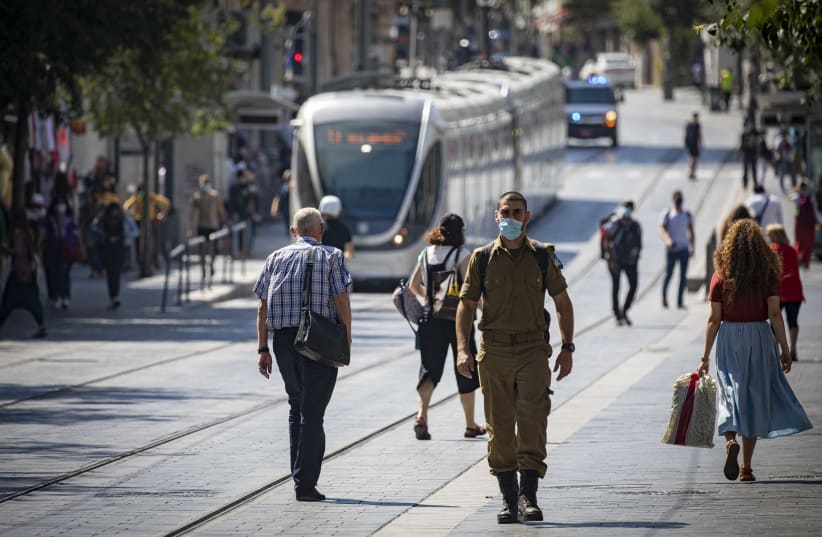Deputy director-general of the Health Ministry Prof. Itamar Grotto stated during a meeting of the coronavirus committee on Tuesday that the goal of the lockdown is to drop to a rate of 7% confirmed infections from the total number of daily tests and for the reinfection (R) rate to fall to below one. On Monday, 11.6% of the tests were confirmed as positive.
After the lockdown, the country will return to the traffic light plan, although the steps to exit the lockdown will be implemented in two-week stages, according to Grotto. "It is not possible to present anything concrete at the moment – it depends on what the success of the lockdown will be."
Grotto explained that the exit strategy has three central components. The first is a gradual return to the traffic light plan, the second is finding and cutting the chains of infection and the third is strengthening hospitals and opening coronavirus wards. Grotto added that the country's epidemiological investigations are still not good enough, but that the recruitment of Home Front Command should help.
"It is possible to go to other steps but unfortunately there are political pressures and pressures from certain sectors," said Grotto. "The advantage of the traffic light plan is that it allows all areas to be opened in a gradual manner."
In response to questions by MK Ayelet Shaked concerning shortening the length of quarantine similar to other countries, Grotto stressed that most countries have not done so and that shortening the length of quarantine could raise the risk of infection.
On Tuesday, the Health Ministry reported that 3,858 new cases were diagnosed on Monday, as well as another 990 between midnight and Tuesday morning. However, only around 34,400 people were screened on Monday, meaning that roughly 11.6% of them or about one in every nine tested positive for the virus.
More than 1,300 people are being treated in the country’s hospitals, including some 668 in serious condition. The death toll rose to 1,285 overnight.
Dr. Vered Ezra, head of the ministry's medical administration, told the committee that out of the over 1,300 patients who are hospitalized, 475 are in serious condition and 177 are in critical condition.
In answer to questions concerning the capabilities of the health system to handle the large number of patients, Health Ministry officials stressed to the committee that while the country has plenty of ventilators it does not have enough doctors who are trained to operate them. The officials explained that while they could add more staff members, inserting untrained staff into the system could cause more harm than good.
Committee members proceeded to argue with Health Ministry officials about the number of shifts provided to the health system and why the system is still understaffed. While the ministry argued that the issue was financial and therefore the Finance Ministry was responsible, the Finance Ministry claimed that this was not so. The Health Ministry also stated that the promised number of shifts had been approved and that if they were not being filled, it was not because of the government.
Some 3,944 medical staff members are in quarantine and 1,728 are confirmed as infected with the coronavirus.Prime Minister Benjamin Netanyahu blamed committee chairwoman Yifat Shasha-Biton for the rise in infections on Tuesday, saying that she disparaged coronavirus restrictions implemented by the government."Anyone who has disparaged the restrictions we have implemented and diluted or repealed them, should not come to us with complaints that the morbidity is rising. We make the necessary decisions for the health and economy of the citizens of Israel – based on professional recommendations and data, and without populism," wrote Netanyahu on Facebook.
Shasha-Biton responded to criticism of the committee, stating that they were not responsible for the rise in infection rates.
"It is important for me to say also to the government: We are all on the same side and want to fight this threat that came to us," said Biton. "We have disagreements along the way but everything is fine, that's how it is in a democracy. As long as we manage it respectfully it's fine."
Also on Tuesday, President Reuven Rivlin and Justice Minister Avi Nissenkorn announced a special system to provide pardons for those in debt due to fines amid the economic crisis. The pardons do not apply to fines incurred due to breaches of coronavirus regulations.
"Too many Israelis found themselves overnight in an economic battle for their lives. At this time, the State of Israel must reach out to its sons and daughters and come to the aid of those who need it," said Rivlin. "We depend on each other for the better, and we should all fight the virus together with a commitment to the mutual responsibility between us."
